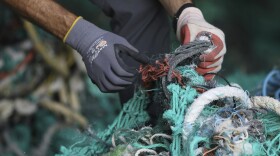A proposal on Moloka?i aimed at giving the community greater control over local fisheries is prompting opposition from some families on the island who say they aren't being heard. The state has been developing a community-based model for marine resource management over 26 years now. But what happens when a community can't agree on how to manage the fishery?
Fishing at Mo?omomi Bay along Moloka?i’s rugged north shore isn’t what it used to be, says 71-year-old Mac Poepoe.
"I seen the changes over time. And, for me, it?s not good,” says Poepoe. “Where?s the 10-pound uhu? That used to be the average size of the uhu that we used to poke. The big ones was like 12 pounds to 14 pounds. You hardly see the big uhu anymore.”

The lifelong Moloka?i fisherman helped found the Hui M?lama ?O Mo?omomi in the early 90s to ensure future generations of Moloka'i residents learn traditional subsistence fishing practices. The group mobilized in response to concerns about declining marine resources that residents rely on for subsistence.
“The intent for us in the beginning was to keep the outside islands from fishing in our place,” says Poepoe.
He pushed a new model for fisheries management based on community-set rules on things like bag limits and gear restrictions. The model created space for traditional fishing practices and established cultural knowledge to be included in the management of local resources. The state adopted the model to allow creation of community-based subsistence fishing areas. A designation is now on the table for Mo?omomi.

“We not telling people they cannot fish. They can fish. We going be limited as well. Same like everybody else,” says Poepoe. “Everybody going be equal.”
For example, the proposed set of rules would limit the taking of kole at 20 fish per person, per day. It currently bans the taking of blue uhu until the population of this particular species of fish is replenished. The rules would also ban night diving and scuba diving in near-shore waters that extend one mile from Mo'omomi Bay.
Kualapu?u kupuna ‘?pu?ulani Albinio grew up with Mo’omomi as her ipukai or source of seafood. She believes the designation helps preserve this community resource at a critical time.
“We live in a time more incredulous than other times,” says Albinio.”We have COVID. People with no jobs. I mean food is scarce. We have a problems with shipping. It's gonna get harder.”
The proposed Mo’omomi Community-Based Subsistence Fishing Area has been in the works for 26 years. Since then H??ena, Kaua?i, secured a designation, and K?p?hulu, Maui, and Miloli?i, Hawai?i, are also seeking designations. But on Moloka?i, some oppose the idea.

Godfrey Akaka Jr. leads the opposition group Native Hawaiian Gathering Rights Association.
“You know, it wasn?t like we just said 'No, we no like.' We actually tried, yeah?” says Akaka.
“We ran around in circles – what kind of rules would we make?” says Akaka. “But we decided that there was no rules that could come up because we felt like it was unfair for us for make one rule for another family that may be practicing something different.”
Akaka says he disagrees with reports by the Hui M?lama ?O Mo?omomi in partnership with the state Department of Land and Natural Resources (DLNR) showing the depletion of marine resources at Mo?omomi - one of the main arguments for the need of restrictions to help replenish fish populations. The opposition group is also distrusting of the state government's involvement in the process.
"What's to stop the state, who we no trust, what's to stop the state next year who comes up with a lame story, 'Oh, we get some more depletion and we need more restrictions?'" says Akaka.
He says the group is not opposed to discussion but reaching an agreement will take time. The proposal could stall if not approved by the Board of Land and Natural Resources.

A DLNR spokesman says the agency recently wrapped up a round of gathering public testimony on the proposal, and will be making a recommendation to the board based on the feedback received. Additional opportunities for comment will be offered at the meeting when the board decides on the designation. A date has not yet been set.

Moloka?i Rep. Lynn DeCoite says she's frustrated with the situation.
"Families are fighting families," says DeCoite.
She says even if the designation is approved by BLNR, enforcement of these rules will be tough on an island known for its non-conforming ways.
“You threaten somebody?s way of life and food source, we?re gonna have problems,” says DeCoite.
What was evident on both sides of the divide is that they all agree greater control of local resources is needed. Whether a community-based subsistence fishing area is the solution is still up for debate.




